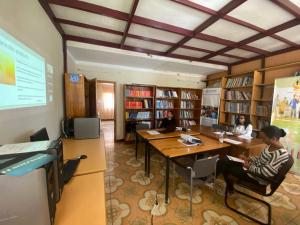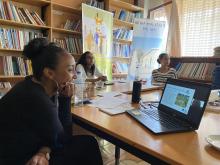First WHO interregional training workshop on ensuring the quality of traditional, complementary and integrative medicine (TCI) products, 14-16 October 2020
To strengthen the role of Traditional, Complementary and Integrative medicine (TCI), WHO conducted its first interregional online training workshop on ensuring the quality of TCI products. The workshop was focused on ensuring quality of TCI products from patient safety perspective, through policy and regulation, and through research. The workshop, attended by 20 Member States (out of which around 50% were from the African region), commenced on Wednesday, 14th of October 2020 at 12:00noon CEST. The Eritrea Ministry of Health which was represented by Ms. Lemlem Hussien and Ms. Leah Abraham, Traditional Medicine Unit (TMU) officers of the National Medicines and Food Administration (NMFA).
The inaugural address was given by Dr. Zhang Qi, WHO Secretariat, where he explained the major purpose of the workshop and assured WHO’s assistance on implementing the WHO Traditional Medicine Strategy 2014-2023. Welcoming address was given by Dr. Choi Peng Cheong, Health Bureau, Government of Macao SAR, China; an introduction session by Dr. Aditi Bana, WHO Secretariat, followed by overview of current global situation of TM. Brief updates on regional perspective from AFRO and South-East Asia were given by Dr. Ossy Kasilo and Dr. Sungchol Kim, respective WHO secretariats. The introductory session was followed by a topic on ensuring quality of TCI products from patient safety perspective which highlighted quality assurance from patient perspective as well as requirements for a proper/safe use of a TCI products. Afterwards, country experiences from Ethiopia and Macao China were presented, outlining their working strategies and major challenges.
The second day of the workshop was about ensuring the quality of TCI products through policy and regulation. An introductory overview was given on the topic, outlining market authorization of TCI products in Brazil, quality control requirements for raw materials (herbal plants and herbal preparations), excipients and packaging materials, and finished herbal products, necessity of country’s legislation for counterfeit products. This was complimented by country experiences from Sri-Lanka, Tanzania, Turkey, Angola, Benin, China and Eritrea.
Representing Eritrea, Ms. Lemlem Hussien, TMU, NMFA presented country experience. She briefly explained the establishment and organizational structure of the Eritrean Traditional Medicine Unit; the Eritrean National Traditional Medicine Policy, its objectives and reasons for the delay in its implementation. She went on to describe the regulatory approach the unit follows in regulation of TM in the country and highlighted the TM-Related Adverse Events Reporting Form (Green Form). She concluded her presentation with the challenges the unit faces. Eritrea’s innovative tool i.e., the “Green Form” attracted participants’ attention and shared the form with countries that expressed interest.
The third and final day of the workshop covered ensuring the quality of TCI products through research. Professor Yoshinori Kobayashi, WHO Temporary Advisor-Research perspective, presented a well-founded lecture on how quality control of herbal products is conducted and what the major challenges faced are. Country experience were shared from Democratic Republic of Congo, Hong Kong SAR, Islamic Republic of Iran, and Mozambique.
Overall, the Eritrea team gained insight into vast experiences from countries around the world and the meeting provided a unique platform for exchange of ideas, experiences and network.




